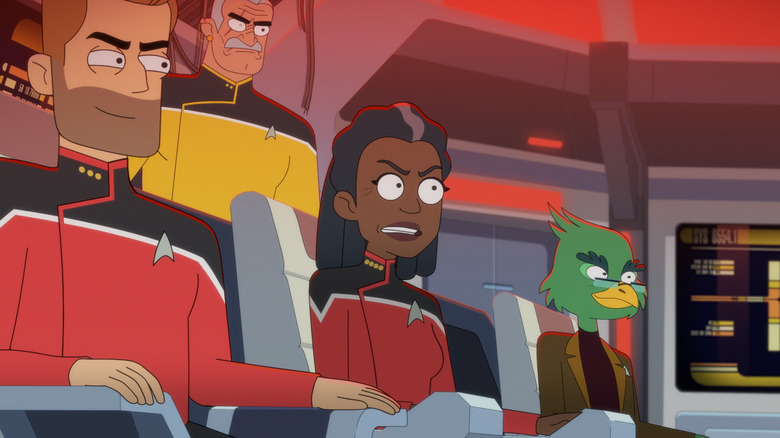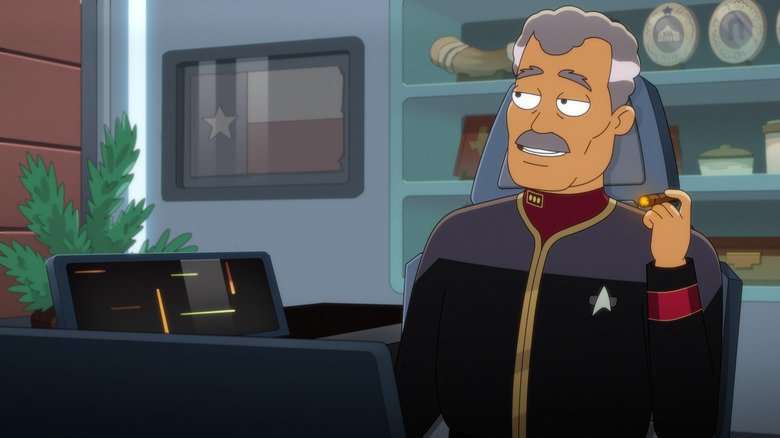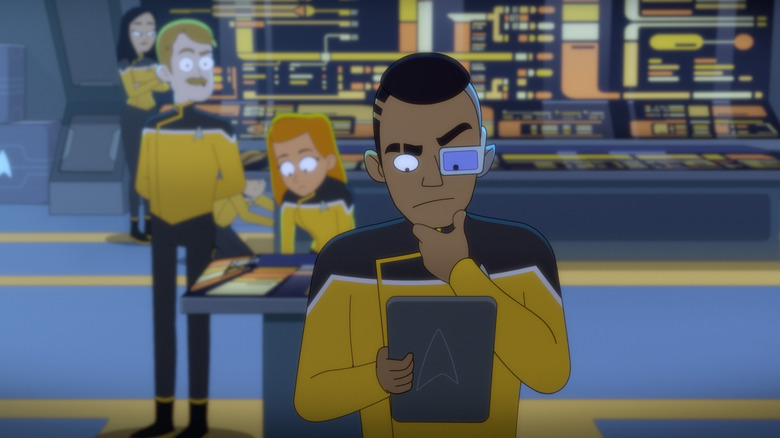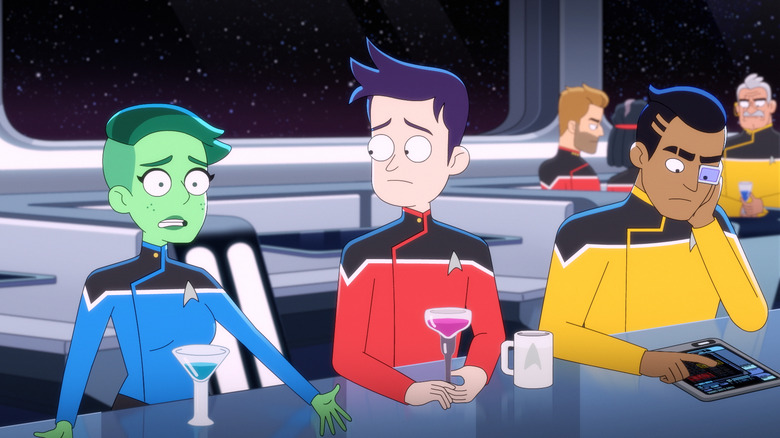Lower Decks Season 3 Wanted To Highlight The 'Unspoken Hierarchy' Of Star Trek
"Star Trek" famously takes place in a post-capitalist society. Starfleet officers receive no paychecks, and their shifts are dictated by their stamina rather than their monetary benefits. Several times throughout "Star Trek: The Next Generation," characters from the 20th or 21st centuries appear on the Enterprise to be told in no uncertain terms that money is a thing of the past. In "Star Trek: First Contact," Capt. Picard (Patrick Stewart) states it plainly: "We work to better ourselves." In terms of trade, "Star Trek" seems to operate entirely on barter (if resources are limited) or on generosity (if they are not). Ships trade medical supplies, equipment, or fuel, for instance.
(Of course, the franchise's post-capitalism runs into a notable snag when the Federation encounters worlds that still operate using monetary trade. Although never explicitly stated, a Trekkie may glean that the Federation has the resources to acquire or even produce money/credits/gold-pressed latinum, should they ever need to buy something they cannot acquire through trade negotiation)
The finale of the third season of "Star Trek: Lower Decks" also points out that the Federation does, in a way, have its own currency. While it may not provide material wealth, a career in Starfleet provides a great deal of prestige. A captain, for instance, is greeted with a great deal more respect than an ensign. Additionally, higher-ranking officers are often seen living in nicer quarters than their lower-ranking counterparts. A stressful job, it seems, warrants a bigger couch.
Prestige is currency
On "Lower Decks," a suspicious admiral named Les Buenamigo (Carlos Alazraqui), upon going rogue (as is natural for "Trek" admirals), states that his malfeasances was inspired by his career dead end. Buenamigo says that he needs to repeatedly "prove himself" in Starfleet by coming up with high-profile projects, lest he be ignored. The implication seems to be that Starfleet officers are motivated, primarily and strongly, by an instinct to be useful. The urge is so strong, in fact, that admirals will commit crimes in order to fulfill themselves.
In an October interview with ComicBook.com, "Lower Decks" creator Mike McMahan clarified that the currency of prestige is actually one of the driving forces behind his show. As "Lower Decks" takes place on a smaller, "lesser" ship in Starfleet — the U.S.S. Cerritos — its captain and crew have to frequently face the embarrassment of not being as useful as bigger, better-equipped ships that are sent on more complicated, sophisticated missions.
The Cerritos is the Rodney Dangerfield of Starfleet — it don't get no respect.
McMahan himself calls it "not the best ship in the fleet," comparing it to the ships of previous "Trek" shows. The various Enterprises were all Starfleet flagships. Deep Space Nine was located in the middle of a political crisis. Even the Voyager was in a unique situation. The Cerritos, by comparison, is tasked with nothing more than everyday, mundane, functional chores.
'Is there something better?'
When finding a modern analog, McMahan finds a capitalist parallel. He sees life in the Cerritos as comparable to working in a lower position in a major tech corporation.
McMahan said:
"Our show is about 'Star Trek' if you aren't the best of the best in the fleet [...]. We talk a lot about stories about people working at Google, or Pixar from a creative point of view, where you get to be the best of the best. And then it's like, 'Well, wait, where do I go from here?' And this is, 'Wait, if I'm already a captain of a Starfleet ship, is there something better?'"
One can, McMahan acknowledges, only rise so far in Starfleet. Capt. Freeman (Dawnn Lewis) is the captain of a ship, but her authority is the same as being the head manager at a franchise restaurant. She may be running as tight a ship as possible, but she is no executive. But then, in order to move up, one must find a better position. McMahan cites multiple examples from "Star Trek" where Captains or Commanders are offered certain positions which they turn down for lack of prestige. Riker (Jonathan Frakes) turned down multiple command opportunities to remain first officer on the Enterprise. McMahan said:
"I think about Riker turning down positions, or the Starfleet stories that we've heard about people who have captained or been on other ships and then they've moved up in rank and they've turned down admiralties and that kind of stuff. There's always been an unspoken hierarchy in 'Star Trek' about who's on the best ships, who's doing this and that, and sometimes people aren't always on them, and these are stories about that."
In its own way, "Lower Decks" might be the purest "Trek" program. The most "Trek" of them all. The lowest tier of the best and the brightest.
Career stagnation
"Lower Decks" also addresses something that the rest of "Trek" often eschews: the notion of career stagnation. Just like back here in our own capitalist society, a career is considered a dead end unless there is a constant upward trajectory. Many people often have to look at their jobs from time to time and ask if they're happy remaining in their current position, or if decisive action needs to be taken to make a big change. A lack of promotions and career movement is seen as a failure in "Star Trek." Look at poor Ens. Kim (Garrett Wang) on "Star Trek: Voyager." Seven years, and he was still an ensign. In the "Next Generation" episode "Tapestry," Picard wakes up in an alternate timeline where he was never daring and never rose above the rank of lieutenant, junior grade.
Conversely, there may be people in Starfleet who are perfectly content to remain ensigns, or who don't seek additional responsibilities. It may be antithetical to the "work to better ourselves" ethos, but finding a niche can often be just as cathartic. McMahan wanted to depict the "Star Trek" version of the retail manager who is relaxed and content with their lot. He said:
"This is a fleet of ships that some people are proud to be on, and some people see it as the ship they have to serve on before they move on, but it is a part of Starfleet. This is a story, in the last couple of episodes, about perception, about seeing where you are and deciding that 'Hey, maybe this is the place for me. Maybe I love this. Maybe I can be the best of the California class instead of seeing it as a stepping stone, but that's totally fine.'"
The B-stories
It was from this perspective that McMahan drew the storytelling philosophy of "Lower Decks" as well. The show is about people who have hit a wall in terms of their careers and have to face a future where they're dealing with low-priority missions. This means older episodes of "Star Trek: The Next Generation" or "Deep Space Nine" — single, one-off episodes — can now be revisited. "Lower Decks" is the B-team following up on B-stories. This is a fulcrum for comedy, of course, but also a glorious expansion of the "Star Trek" universe. There is nothing that will expand fictional canon better than delving into that canon's quotidian details.
McMahan elucidated by using a notion from "Deep Space Nine."
"When the Defiant came on Deep Space Nine, they had not as good replicators. They're sleeping in bunks. It's all energy usage and energy consumption and who has access to what replicator codes, and all of these different kinds of things that have always been in the margins of 'Star Trek.' It's little moments, but 'Lower Decks' has always lived in the B-stories of 'Star Trek.' It's going back to planets that we've only been to once or seeing bad guys, aliens, that we've only seen once, or talking about these little things that were offhand-mentioned and making them a bigger thing."
"Star Trek: Lower Decks" just completed its third season. All episodes are available on Paramount+.




